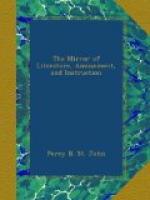Natches is a pleasantly situated town, or rather a steep hill, about half a mile from the landing place, where are many stores and public houses. The boat remained here an hour, and we ascended to the upper town, a considerable place, with a town-house, and several good streets and well-furnished shops, in which we purchased some books. This place exports much cotton, and the planters are said to be rich. It commands a fine prospect over the river and surrounding country. It has been tried as a summer residence by some of the inhabitants of New Orleans, but the scourges of this part of America (fever and ague) extend their ravages for more than 1000 miles higher up. A partial elevation of ground, in an unhealthy district, has been proved to be more pernicious, than even the level itself. From hence, to the junction of the Ohio, there is little to interest the stranger, excepting the diversity of wood and water. The ground rises in some places, though with little variety, till you pass the junction of the Ohio, 1253 miles from the sea. Shortly after entering the Ohio, the country begins to improve; you perceive the ground beginning to rise in the distance, and the bank occasionally to rear into small hills, which show their strata of stone, and rise into bluffs, projecting into the bends of the river, shutting it in, so as to produce the effect of sailing on a succession of the finest lakes, through magnificent woods, which momentarily changed their form, from the rapid motion of our boat. It was now full moon, and these scenes viewed during the clear nights, were indescribably beautiful.— Bullock’s Journey to New York.
* * * * *
IRISH TWINS.
The Miss Mac Taafs were both on the ground, and both standing enough in profile, to give Lord Arranmore a full and perfect view of their figure, without being seen by them. His first opinion was, that they were utterly unchanged; and that like the dried specimens of natural history, they had bidden defiance to time. Tall, stately, and erect, their weather-beaten countenance and strongly marked features were neither faded nor fallen in. The deep red hue of a frosty and vigorous senility still coloured their unwrinkled faces. Their hair, well powdered and pomatumed, was drawn up by the roots from their high foreheads, over their lofty “systems;” and their long, lank necks rose like towers above their projecting busts; which, with their straight, sticky, tight-laced waists, terminating in the artificial rotundity of a half-dress bell-hoop, gave them the proportions of an hour-glass. They wore grey camlet riding habits, with large black Birmingham buttons (to mark the slight mourning for their deceased brother-in-law): while petticoats, fastened as pins did or did not their office, shewed more of the quilted marseilles and stuff beneath, than the precision of the toilet required: both of which, from their




